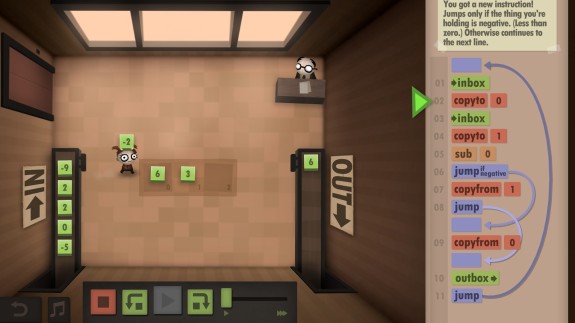
The fine folks at Nintendo Everything asked us some tough questions about Human Resource Machine, the Wii U, and what it’s like being an indie developer in 2015 – full interview here.

The fine folks at Nintendo Everything asked us some tough questions about Human Resource Machine, the Wii U, and what it’s like being an indie developer in 2015 – full interview here.
My girl showed me an article about this game a few days ago, and I’ve been eagerly awaiting it since. I have started studying computer programming as a hobby recently. I’ve been showing my girlfriend some of the exercises I’ve been doing, in the book I’m learning from. And, she’s so sweet, she humors me and acts impressed. But she can’t fully appreciate it for the same reasons I do, since it’s my hobby and not hers. Still, I wish she could experience the feeling you get when you cobble together a tricky segment of code, and it works exactly the way you want it to. It’s a great rush.
Could this be the game to share what it was that I wanted to share with her? Could this game convey the feeling? I have high hopes that this can be a way for us to both have fun together, learn a little, and to share an interest if nothing else. I’d preorder now, but I’m waiting on the Wii U version.
That programming “rush” you describe is one of the reasons we were excited to build this game! It’s tough to convince people how fun programming is, or describe that burst of glee when you finally discover a creative solution to a tough problem. I even had tons of fun building a resource manager for a different project last year. A resource manager. We’ll see if HRM can bring that same logical joy to non-programmers – let us know how it goes!
Yeah, I also feel like this is the same thing with mathematics as well, which sometimes ties in to specific aspects of programming. Currently I’m really at the syntactical hump of programming – I wish it were as simple as other programming puzzle games where you just drag stuff in, rather than memorize all these different function names and syntax restrictions.
Have you played any other games like this – including the few mentioned in the interview?
How will the difficulty of this game compare to others in the same genre?
We think the main puzzles will be solvable by all players, even non-programmers. The optional challenges in each level though can be extremely difficult.
How would you describe that difficulty to TIS-100, for example? Harder?
Also if you don’t mind, are the challenges going to be minimums (like Great Permutator did with their online minimum score setup)? I’m not sure if you’re going to have a post-challenge content system, if that makes any sense.
I haven’t played TIS-100 yet, so you will have to let me know! We put a lot of work and playtesting into easing players into this type of puzzle as gently as possible, so I hope this is one of the more accessible programming games, at least in the initial ramp up. Each level has a size and a speed challenge, where you can try to hit some minimum level of optimization on each axis.
Yeah, I agree with that. TIS-100 is a really intimidating looking game at first, as well. Do you have any other programming puzzlers like Jahooma’s LogicBox or Manufactoria to compare the game to?
As to the challenges – this is the problem with all optimization puzzlers that show a predefined number (which is why I referenced Great Permutator as it doesn’t have this problem) – what if there was a solution you guys did not expect that was better in instructions or steps for a given level? Will it be like Great Permutator where if a player does get a better score, a server confirms the solution and updates the worldwide minimum?
Wait a minute, the puzzle in the screenshot doesn’t have a minimum of 11 instructions 😛
Dears,
Do you plan to bring your video game on IOS ?
Sébastien
Affirmative.